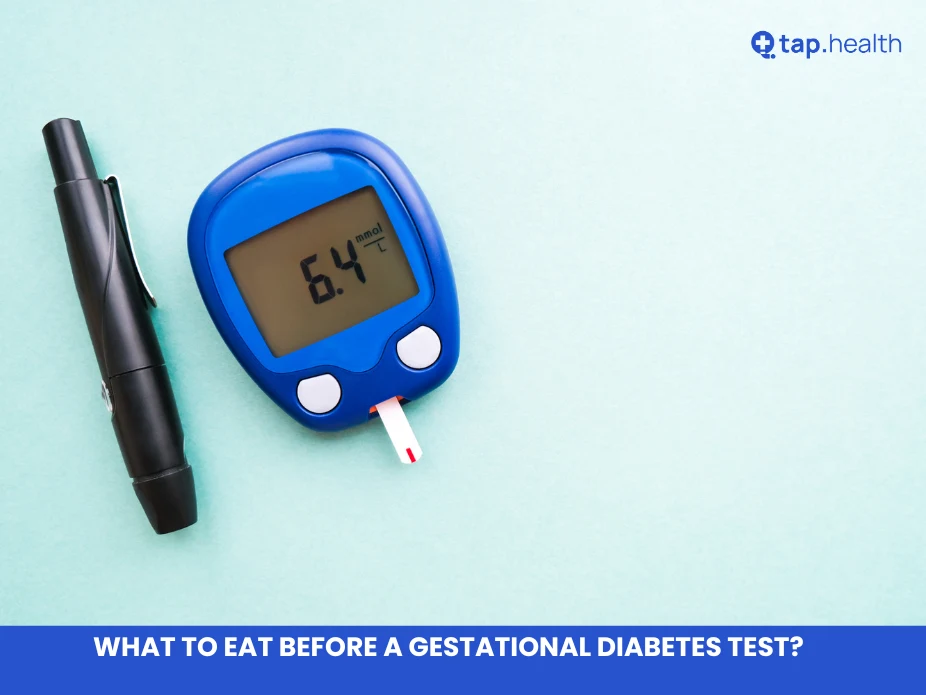Gestational diabetes mellitus (GDM) affects 6–9% of pregnancies worldwide. Doctors screen for it using two standard tests: the 1-hour Glucose Challenge Test (GCT) and, if needed, the 3-hour Oral Glucose Tolerance Test (OGTT). Your diet in the hours or days leading up to these tests directly impacts blood glucose readings and diagnostic accuracy.
Key Differences Between GCT and OGTT
- Glucose Challenge Test (50g GCT): Non-fasting screening test usually done between 24–28 weeks. You drink a 50g glucose drink; blood is drawn after 1 hour. No fasting required.
- Oral Glucose Tolerance Test (100g OGTT): Diagnostic test performed only if GCT is abnormal. Requires 8–14 hours of overnight fasting, followed by blood draws at fasting, 1-hour, 2-hour, and 3-hour marks after a 100g glucose load.
What to Eat Before the Non-Fasting Glucose Challenge Test (GCT)
Since fasting is not required, eat a light, balanced meal 1–2 hours before arriving at the lab. Focus on foods that prevent sharp blood sugar spikes:
Recommended Foods:
- Complex carbohydrates: Oats, quinoa, whole-grain toast, brown rice
- Lean protein: Eggs, Greek yogurt (unsweetened), grilled chicken, tofu, lentils
- High-fiber vegetables: Spinach, broccoli, cauliflower, zucchini
- Healthy fats: Avocado, almonds, walnuts, chia seeds, olive oil
- Low-glycemic fruits: Berries, apple with skin, pear
Sample GCT Morning Meal:
- 2 scrambled eggs + 1 slice whole-grain toast + half avocado + handful of spinach
- Overnight oats made with unsweetened almond milk, chia seeds, and berries
What to Eat the Night Before a Fasting OGTT
Your dinner the evening before the 3-hour test should be your last meal (finish by 8–10 PM if your test is at 8–9 AM). Aim for balanced macros:
Ideal Night-Before Dinner Plate:
- Grilled salmon or paneer
- Large portion of non-starchy vegetables (broccoli, bell peppers, leafy greens)
- Small portion of complex carbs: sweet potato, quinoa, or brown rice
- Healthy fat: olive oil dressing or a few nuts
Avoid desserts, fruit juice, white rice, pasta, bread, and anything labeled “low-fat” (usually high in sugar).
Foods to Strictly Avoid 24–48 Hours Before Either Test
- Sugary drinks, candy, pastries, cookies
- White bread, white rice, regular pasta, noodles
- Fruit juice, sweetened yogurt, flavored oatmeal packets
- Fried foods, chips, french fries
- High-sugar fruits in large amounts (mango, pineapple, grapes)
Can You Drink Water or Coffee Before the Test?
- Water: Yes, drink plenty — hydration is encouraged even during fasting.
- Black coffee or tea (no sugar/milk): Usually allowed in small amounts for GCT; confirm with your doctor.
- Zero-sugar sparkling water: Generally safe.
Real Patient Example (2024)
Priya, 31 weeks pregnant in Bangalore, shared: “I had steel-cut oats with boiled eggs and cucumber at 7:30 AM before my 10 AM GCT. My result came 112 mg/dL — well within normal. For the OGTT the next week, I ate grilled chicken with palak paneer and quinoa the previous night and fasted properly. All values normal!”
Latest Guidelines from ACOG & ADA (2025)
American College of Obstetricians and Gynecologists and American Diabetes Association continue to recommend:
- No special “carbohydrate loading” three days before the test (older protocols discontinued)
- Normal balanced eating until the night before fasting test
- Avoid excessive simple carbs 24 hours prior
Quick Reference Table: Diet Summary
| Test Type | Fasting Required? | Can Eat Before Test? | Best Foods | Avoid |
|---|---|---|---|---|
| 1-hour GCT | No | Yes (light meal) | Eggs, oats, veggies, nuts | Sugar, juice, white bread |
| 3-hour OGTT | Yes (8–14 hrs) | No (only water) | Balanced dinner night before | Desserts, refined carbs, fried food |
How Can TapHealth Help Manage Diabetes During Pregnancy?
TapHealth’s dedicated gestational diabetes management program offers continuous glucose monitoring (CGM) insights, personalized meal plans by expert dietitians, 24×7 obstetrician support, and daily fetal movement tracking — helping thousands of mothers keep blood sugar in target range without stress.
Accurate preparation for your gestational diabetes test starts with the right food choices. Follow your doctor’s specific instructions, stay hydrated, and eat balanced meals to get reliable results and protect you and your baby’s health.
References-
Cleveland Clinic – Glucose Test During Pregnancy:
Blue Cross Blue Shield of Michigan – What to Eat Before a Glucose Test:



